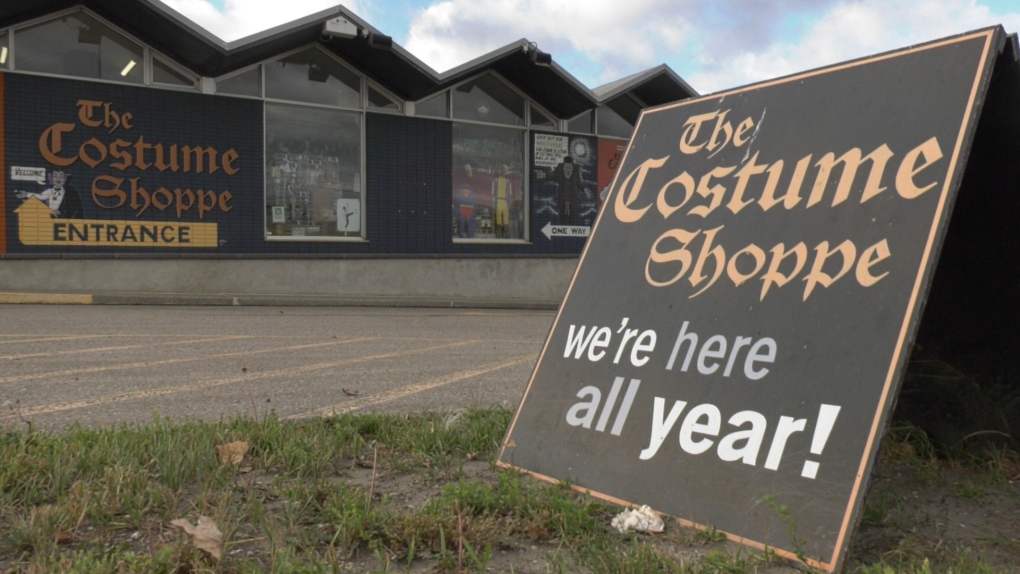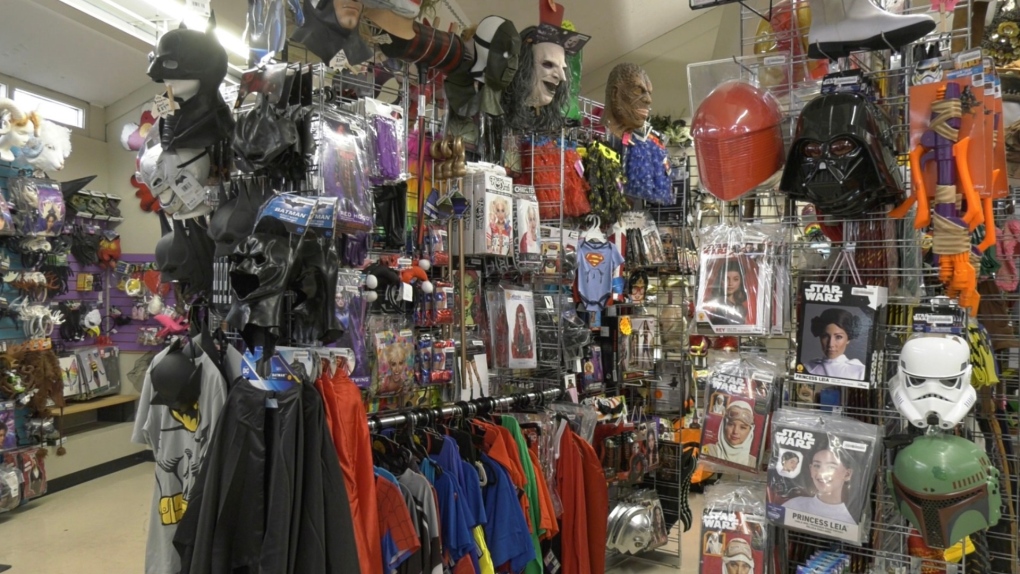Canada Border Services Agency wins award for 'most ridiculous' red tape regulations
The Canada Border Services Agency (CBSA) has won a not-so-prestigious award that highlights the "most ridiculous" examples of red tape from across the country.
The Paper Weight Award from the Canadian Federation of Independent Business (CFIB) is awarded annually as part of the organization's Red Tape Awareness Week.
This year, the CBSA was given the dubious honour for what the CFIB describes as a "burdensome and unfair" decision to implement more than $100,000 in import duties fees to a Calgary costume business.
The award, announced on Tuesday, is for regulation changes it made to the classification of themed costumes, which comes with highly expensive taxes.
"From an organizational standpoint we've recognized how ridiculous these back taxes are and it appears that one business is being singled out as opposed to large retailers across the country," said Andrew Sennyah, Alberta CFIB senior policy analyst.
That business is The Costume Shoppe, located along Blackfoot Trail S.E., which has been in operation for nearly 25 years and regularly imports themed costumes for special occasions and holidays.
Store owner Ryan Schoel had been importing his costumes under Chapter 95.05 of the Canadian Customs Tariff, which classifies the goods as 'festive wear' and comes with zero import duties.
 Costume Shoppe store owner Ryan Schoel says he was notified in 2022 that costumes were no longer considered 'festive wear' imports.He was notified by the CBSA in late 2022, however, that his costumes were no longer classified as 'festive wear' imports and instead are now classified as 'fancy dress' imports under Chapters 61 and 62.
Costume Shoppe store owner Ryan Schoel says he was notified in 2022 that costumes were no longer considered 'festive wear' imports.He was notified by the CBSA in late 2022, however, that his costumes were no longer classified as 'festive wear' imports and instead are now classified as 'fancy dress' imports under Chapters 61 and 62.
Classifying the goods under Chapters 61 and 62 comes with an 18 per cent duty fee, plus applicable taxes, which have now been retroactively charged back to the business dating back to 2021.
"We all import under 95.05 and the government itself in its final report said to me 'you had no reason to believe you did anything wrong,'" Schoel said.
"But it's wrong, they say it's not a costume, I mean come on… Mario, Luigi, or Ghostface, they're all costumes."
Schoel, who has more than 2,500 costumes in stock, must now refile previous inventory, even if those goods are no longer imported, and he can't appeal the CBSA's decisions until he pays first.
"This could be $100,000, it could be $200,000. What's super frustrating is that I've spoken to my contemporaries and spoken to a bunch of the major outlets across the country and everybody does the exact same thing," he said.
"It's sort of like being told you committed a crime, going to jail for the term and then going into court to fight your case. In this case, I was asked to pay an amount without the opportunity to fight it. How ridiculous does that sound?"
Schoel has since paid the first installment of his appeal in the 90-day deadline he had which cost him $6,000.
He sent in an appeal to the CBSA, but has been given no timeline of when it could be heard.
Overall, he's paid about $60,000 so far to lawyers, brokers and consultants to defend himself.
As a result, he's had to lay off some of his staff members and may have to scale down his business even further.
"I've been speaking to some different lawyers and the bill could cost anywhere from $30,000 to $150,000 to defend this," Schoel said.
"If I'm not able to pay this, I'm just going to have to liquidate and close. I mean, I don't want to sound dramatic, but that's a fact in this case. I had to make that decision in December, either I'm going to keep the fight or I'm not going to keep the fight going. I made the decision to keep fighting."
Schoel says he'd just like to see an even playing field for everyone, adding that he has no idea why his one business is being targeted.
 Costume Shoppe store owner Ryan Schoel says he was notified in 2022 that costumes were no longer considered 'festive wear' imports.CTV News has contacted other big-box retailers like Canadian Tire-owned Party City and Loblaws to inquire if they are paying extra import duties on their costumes, but no responses have been received.
Costume Shoppe store owner Ryan Schoel says he was notified in 2022 that costumes were no longer considered 'festive wear' imports.CTV News has contacted other big-box retailers like Canadian Tire-owned Party City and Loblaws to inquire if they are paying extra import duties on their costumes, but no responses have been received.
Some small businesses offering costumes in Calgary were also contacted, but no other interviews were granted for fear of retaliation from the CBSA.
'Huge waste of time'
Federal director of the Canadian Taxpayers' Federation, Franco Terrazzano, says his heart goes out to Schoel for the anxiety and impending bills which are taking a toll on his livelihood.
"Why is the government making it more expensive for this business owner to sell costumes? It shouldn't. This is a huge waste of time and huge waste of resources and a huge burden that the government is putting on this business that is just trying to sell costumes," Terrazzano said.
"And from the taxpayer perspective, I mean, it's a huge waste of money for taxpayers to be paying for a bunch of busybody border bureaucrats to be inspecting costumes for quality and craftsmanship."
Terrazzano went on to say that the government should be looking for ways to make life more affordable for small businesses, instead of singling this one out.
The CFIB says there have also been instances where costumes or other goods of the same quality were imported through large, big-box online retailers like Amazon who were exempt from such duties.
A recent ruling by the Canadian International Trade Tribunal (CITT), Loblaws Companies Limited v. Canada Border Services Agency, 2011, determined there is precedence that items of "festive wear" regardless of cost or quality, are exempt from Chapters 61 and 62.
In this case, the CBSA deemed Halloween costumes being imported by Loblaws Canada did not fall under Chapter 95 of the Canadian Customs Tariff.
However, the CITT ruled that "most people would likely distinguish Halloween costumes from regular clothing" and further noted "the goods in issue clearly have a festive value and finds that any elements similar to apparel are only of secondary importance."
CBSA response
CTV News requested an interview with both the CBSA and Public Safety Minister Dominic Leblanc and received the following response:
"The CBSA administers the Canadian Customs Tariff, it does not set how goods are classified or the amount of duties applied. We take the views of industry on how we administer our customs administration responsibilities seriously as we ensure compliance with Canadian laws," the statement read.
If not the CBSA, then the question remains as to who is responsible for classifying imported goods. CTV News followed up and is waiting for a response.
The CBSA went on to say, "All companies, small or large, are subject to the same tariff classification and duties for the same goods."
However, a letter obtained by CTV News from the federal government to the manufacturer of Mario and Luigi costumes stated those costumes could be imported without fees.
In a previous statement from the government agency, the CBSA said its administrative policy regarding the tariff classification of costumes is outlined in Departmental Memorandum D10-14-62.
"The textile costumes classifiable in Chapters 61 and 62 are distinguished from those classifiable in Chapter 95 by the nature of the goods. Textile costumes that are designed and constructed in a manner that allows for repetitive use, that are comparable in quality and value to articles of clothing (e.g., theatrical costumes, rental costumes, historical re-enactment costumes, etc.) are classified in Chapter 61 or 62, as appropriate, and excluded from Chapter 95 by the application of Note 1(e) to that chapter. In order for a textile costume to qualify for classification as a festive article of Chapter 95, the garment must exhibit significant deficiencies in terms of styling, construction, finishing touches and embellishments," the CBSA's statement read.
"Costumes are referred to as articles of fancy dress in the Harmonized System. This is an international nomenclature that uses British English as its working language. The Oxford Dictionary definition of fancy dress is: 'an unusual or amusing costume worn to make someone look like a famous person, fictional character or an animal, especially as part of a theme at a party.'"
The CBSA also said it is aware of the recent CITT Loblaws ruling.
"Verification officers take all relevant information into account when making tariff classification decisions. In a verification, each item is considered individually, and a determination is made based on the specific item and, in this case, how it meets the criteria set out in the Harmonized System and departmental policies," it said.
CTV News asked the CBSA whether it would remove the import duties from the Costume Shoppe, and the response was:
"Should an importer disagree with any of the tariff classification decisions in a compliance verification, appeal rights are available under the Customs Act."
In a Tuesday release outlining the 2024 Paper Weight Awards, the CFIB said the CBSA should revert to classifying themed costumes sold by small businesses as 'festive wear.'"
CTVNews.ca Top Stories

BREAKING Donald Trump picks former U.S. congressman Pete Hoekstra as ambassador to Canada
U.S. president-elect Donald Trump has nominated former diplomat and U.S. congressman Pete Hoekstra to be the American ambassador to Canada.
Genetic evidence backs up COVID-19 origin theory that pandemic started in seafood market
A group of researchers say they have more evidence to suggest the COVID-19 pandemic started in a Chinese seafood market where it spread from infected animals to humans. The evidence is laid out in a recent study published in Cell, a scientific journal, nearly five years after the first known COVID-19 outbreak.
This is how much money you need to make to buy a house in Canada's largest cities
The average salary needed to buy a home keeps inching down in cities across Canada, according to the latest data.
'My two daughters were sleeping': London Ont. family in shock after their home riddled with gunfire
A London father and son they’re shocked and confused after their home was riddled with bullets while young children were sleeping inside.
Smuggler arrested with 300 tarantulas strapped to his body
Police in Peru have arrested a man caught trying to leave the country with 320 tarantulas, 110 centipedes and nine bullet ants strapped to his body.
Boissonnault out of cabinet to 'focus on clearing the allegations,' Trudeau announces
Prime Minister Justin Trudeau has announced embattled minister Randy Boissonnault is out of cabinet.
Baby dies after being reported missing in midtown Toronto: police
A four-month-old baby is dead after what Toronto police are calling a “suspicious incident” at a Toronto Community Housing building in the city’s midtown area on Wednesday afternoon.
Sask. woman who refused to provide breath sample did not break the law, court finds
A Saskatchewan woman who refused to provide a breath sample after being stopped by police in Regina did not break the law – as the officer's request was deemed not lawful given the circumstances.
Parole board reverses decision and will allow families of Paul Bernardo's victims to attend upcoming parole hearing in person
The families of the victims of Paul Bernardo will be allowed to attend the serial killer’s upcoming parole hearing in person, the Parole Board of Canada (PBC) says.


































